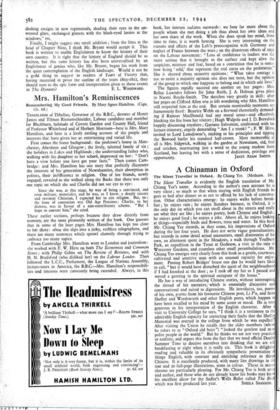Mrs. Hamilton's Reminiscences
Remembering My Good Friends. By Mary Agnes Hamilton. (Cape. 12s. 6d.)
TRANSLATOR of Dibelius, Governor of the B.B.C., devotee of Henry James and Tilman Riemenschneider, Labour candidate and member for Blackburn habitue of Covent Garden and County Hall, friend of Professor iliteltead and of Herbert Morrison—here is Mrs. Mary Hamilton, and here is a lively rattling account of the people and interests tha: have given her an entertaining and varied life.
First comes the home background: the professor's house in Man- chester, Aberdeen and Glasgow ; the lively, talented family of six ; the holidays in Lakes and Highlands • the understanding father who, walking with his daughter to her school, impressed on her: " Don't have a view before you have got your facts." Then comes Cam- bridge: and Mrs. Hamilton has one story that perfectly illustrates the interests of her generation of Newnhamites, their absorption in politics, their indifference to religion. One of her friends, newly engaged, revealed as she walked along the Backs that there was only one topic on which she and Charlie did not see eye to eye:
Since she was, at this stage, by way of being a convinced, and even militant, materialist, and he was, as I knew, a deeply sincere and reverent Christian, I expected her to cite religion. But, no ; the bone of contention was Old Age Pensions: Charlie, to her distress, was in favour of a noncontributory scheme. " But I hope to convert him," she cried.
These earlier sections, perhaps because they draw directly from memory, are the most pleasantly written of the book. One guesses that in some of the later pages Mrs. Hamilton has kept too close to her 'diary : often she slips into a jerky, verbless telegraphese, and there are -many sentences which sprawl clumiily through trying to embrace too many topics.
From Cambridge Mrs. Hamilton went to London and journalism: she worked with F. W. Hirst on both The Economist and Common Sense ; with Philip Gibbs on The Review of Reviews, and with H. N. Brailsford (who disliked her) on the Labour Leader. Then followed the L.C.C., Parliament, the League of Nations Assembly, lecture-tours in America, the B,B.C.—Mrs. Hamilton's responsibili- ties and interests were constantly being extended. Always, in this book, her interest radiates outwards: we hear far more about the people whom she met doing a job than about her own ideas and her own share of the work. When she does speak her mind, from time to time, it is worth hearing She is very interesting on the reasons and effects of the Left's preoccupation with Germany and neglect of France between the wars ; on the disastrous effects of 1931 on the Labour movement: "Loss of confidence in leaders was the more serious that it brought to the surface and kept alive the suspicion, mistrust and fear, based on a conviction that he is some- how being ' sold,' that represent the real curse on the proletarian." She is shrewd about minority opinions: " What takes courage is not to resist a majority opinion one does not meet, but the opinion of the group to which one happens to belong and in which one lives."
The figures rapidly succeed one another on her pages: Mrs. Belloc Lowndes follows Sir John Reith, J. A. Hobson gives place to Naomi Royde-Smith. The sketches vary greatly in skill: after her pages on Clifford Allen one is left wondering why Mrs. Hamilton still respected him at the end. But certain memorable moments are humorously fixed: Beatrice Webb on a firestool rhetorically demand- ing if Ramsay MacDonald had any moral sense—and effectively blocking the fire from her visitors ; Hugh Walpole and J. D. Beresford happily discussing royalties ; Gaetano Salvemini, confronted with his lecture-itinerary, angrily demanding "Am -I a trunk? " ; F. W. Hirst, invited to Lord Lansdowne's, sticking to his principles and tipping the Bowood butler his standard half-crown. Most memorable of all is Mrs. Sidgwick, walking in the garden at Newnham, old, frail and stricken, murmuring just a word to the young student from Scotland, but leaving her with a sense of dedication, privilege and
opportunity. JANET ADAM SMITH.


























 Previous page
Previous page